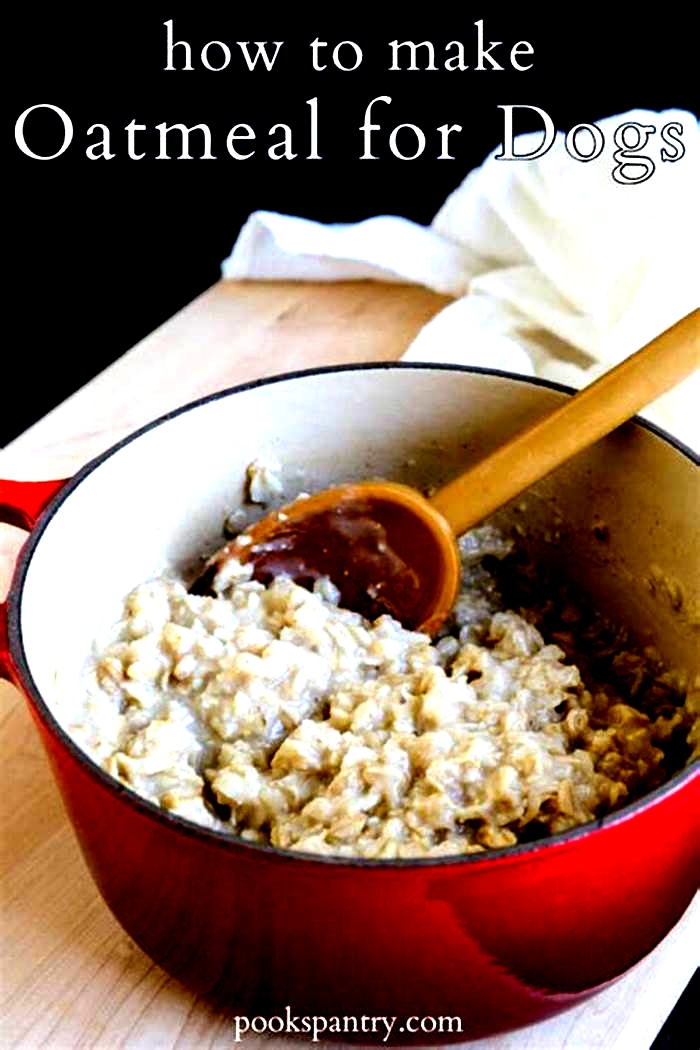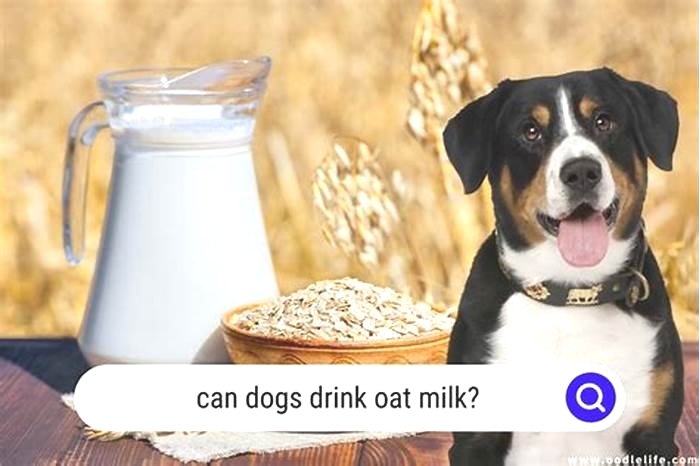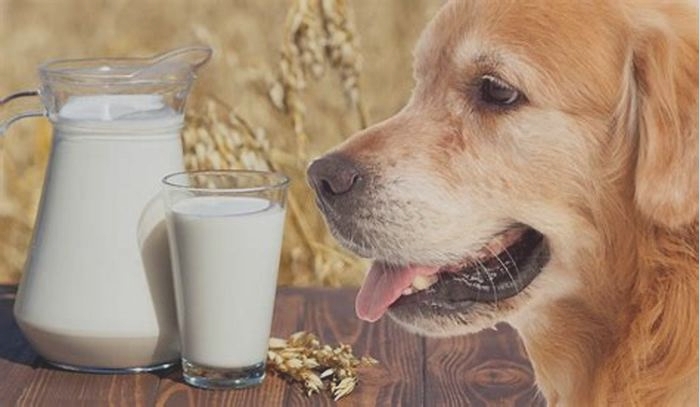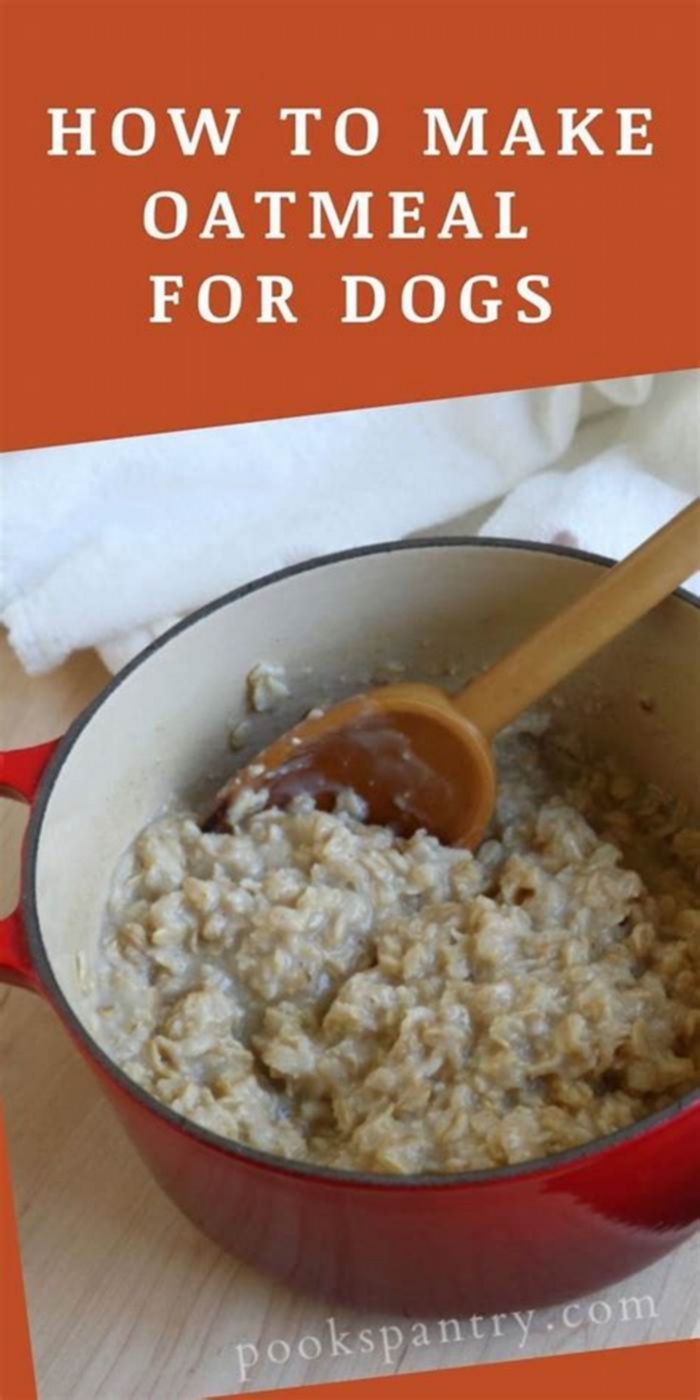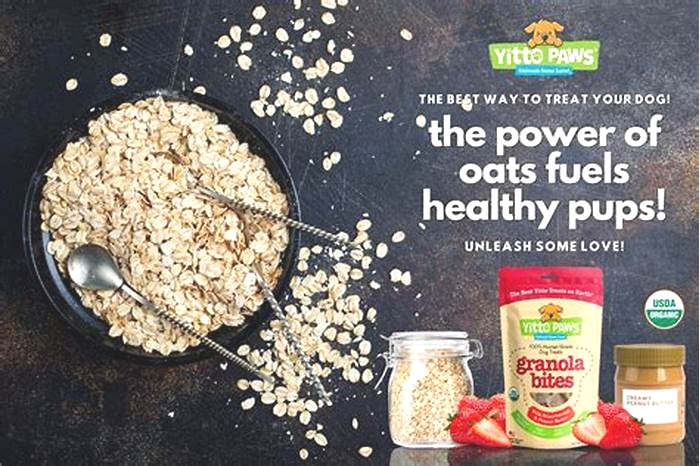is oatmeal milk good for dogs

Is it ok to give my dog plant-based milk?
Can I give my dog regular cows milk?
Milk is rich in different vitamins and minerals. At a first glance, can be seen as a healthy and ideal source of nutrients for dogs. However, as nutritious as milk is, it isnt always a good idea to give to dogs as it can cause several gastrointestinal problems. Most dogs are lactose-intolerant and cant properly digest milk. Milk also has high fat and sugar content that can cause weight problems or diabetes in dogs if given regularly.
What are plant-based milk products?
Plant-based milk is extracted from different plant sources such as soy, almond, coconut, and oat. Unlike traditional milk harvested from a cows mammary glands that are rich in protein, vitamins, and minerals, plant-based milk contains lower nutritional content. In some plant-based milk, some nutritional components seen in traditional milk like sugar and calcium are absent. They also tend to have lower lactose content making it safe to give to dogs with established lactose- intolerance.
Commonly seen plant-based milk alternatives are soy, almond, and oat milk. Though considered generally safer than traditional milk, it is still best to understand whats inside these plant-based milk products, their nutritional components, and other ingredients to determine if plant-based milk is safe to give to your dog and what type is appropriate for your dogs nutritional needs.
Things to Consider Before Adding Plant-Based Milk to Your Dogs Diet
Its normal for dog owners to want to provide the best diet and nutrition for their dogs. While plant-based milk products are often a safer alternative to traditional milk while retaining some of the same nutritional benefits, its still best to consult your vet and discuss the benefits and risks of giving plant-based milk to your dog.
Each type of plant-based milk has some health risks that all dog owners need to keep in mind. It is best to weigh the benefits of supplementing milk alternatives against the possible health risks it may cause. In most dogs that are getting a high-quality diet, additional supplements or food ingredients are rarely needed to meet their nutritional needs.
In cases where supplementing the diet with plant-based milk is recommended, discussing the type of milk alternative with your vet is important, as each type has different nutritional values and health implications.
Is Soy Milk Safe for Dogs?
Soy milk is the most popular and the most common plant-based milk alternative available. It is derived from soybeans and is a good alternative protein source for both humans and animals. In fact, soy protein is a common ingredient in most commercially available dog food. Soy milk is made by soaking, grinding, and boiling soybeans and filtering out solid particles.
While soy milk can be a good protein source for dogs, some things need to be considered before supplementing your dog with one. The most common health problem associated with soy milk supplementation in dogs is an allergic reaction. Food allergy in dogs occurs when their body mounts an immune response against a potentially allergic component in the food or drink they ingest.
Most food allergy cases in dogs are caused by a reaction towards the protein component in the diet. Since soy milk contains high amounts of protein, it poses a relatively higher risk of triggering an allergic reaction in dogs compared to other milk products.
Most soy milk commercially available has sugar added to them during preparation. Continuous supplementation of regular soy milk to dogs can increase the risk of diabetes mellitus, a hormonal condition that often requires lifetime treatment and management. The sugar component can also slowly degrade the dogs teeth and lead to periodontal disease.
An alternative to prevent problems like these from developing is using unsweetened soy milk products for your dogs.
Is Almond Milk Safe for Dogs?
Almonds, unlike other nuts, are not toxic and are considered very safe to give to dogs. Naturally, milk extracted from almonds should be the same. Regular almond milk is popular in humans who are on a strict ketogenic diet because of its low calorie and protein content and relatively higher fat content compared to other milk alternatives. In dogs, almond milk is safe to give in small amounts as some sort of treat or supplement.
Problems encountered in giving almond milk in dogs are mostly related to digestion issues. Almond, being high in fat, can be difficult to digest by some dogs, resulting in gastrointestinal signs like watery and oily diarrhea.
The high-fat content of almond milk can also potentially lead to pancreatitis in dogs, a serious gastrointestinal condition that can be fatal if not addressed immediately. This condition is usually triggered by the ingestion of high-fat food ingredients, a category almond milk falls into. If you decide to give your dog almond milk, its best to give it in small amounts to prevent these health problems from developing.
Is Oat Milk Safe for Dogs?
Oat milk is derived from whole oat grains soaked and mixed in water, sometimes with an added sweetener such as sugar. Oat milk is highly digestible and has practically no toxic components, making it very safe to give to dogs. It also contains higher nutritional components such as vitamin B-complex, calcium, and Vitamin D compared to other plant-based milk products.
The only risk associated with oat milk in dogs is its relatively high fiber content. While fiber is essential in keeping a healthy GI tract, too much of it can lead to various symptoms like constipation and diarrhea. Like with other plant-based milk alternatives, oat milk is best given in moderation to avoid any potential gastrointestinal problems.
Read more:
Can dogs drink milk?
Can cats drink milk?
7 Lesser-Known Foods That Are Toxic to Dogs
Need to speak with a veterinarian regarding your dogs food/drink or another condition?
Click here to schedule a video consult to speak to one of our vets. You can also download the FirstVet app from the Apple App Store and Google Play Stores.
Can Dogs Eat Oatmeal, and Should They?
Cooked oatmeal can be a healthy addition to your dogs diet. You should opt for plain varieties prepared with water instead of milk, and increase the amount slowly over time to assess your dogs tolerance.
Oatmeal is a common breakfast staple thats favored for both its versatility and potential health benefits.
It has also become an increasingly common ingredient in many types of commercial dog food.
While it seems clear that oatmeal is generally safe for your canine companion, you may wonder whether you should use caution with some preparation methods and if its truly healthy for them.
This article reviews whether dogs can and should eat oatmeal.
Oatmeal is highly nutritious and has been associated with several potential health benefits.
Promotes skin health
Oats are rich in B vitamins and linoleic acid, a type of omega-6 fatty acid (
B vitamins play a key role in skin health and may be involved in the production of healthy skin cells (
Meanwhile, linoleic acid is also essential for skin health and can help maintain the integrity of the skin barrier, promote wound healing, and alleviate inflammation (
Although these benefits have not been studied in dogs specifically, dog skin is similar to human skin.
Supports digestion
Oatmeal is high in fiber, with over 4 grams of fiber in each cooked cup (240 grams) (
Fiber has been linked to a number of potential health benefits, especially in terms of digestive health.
Fiber moves slowly through your body undigested, adding bulk to stool to support regularity (
Although studies in dogs specifically are limited, research suggests that increased fiber intake may be beneficial for treating constipation (
May lower cholesterol levels
If your dog has high cholesterol levels due to metabolic or genetic health conditions, oatmeal may be beneficial.
This is because oats are a good source of beta glucan, a type of fiber that has been associated with improved heart health (
Humans studies have shown that oats could help reduce cholesterol levels, especially in people with high cholesterol (
One study in 14 dogs observed similar findings, showing that supplementing with oat beta glucan for 71 days reduced levels of total and LDL (bad) cholesterol (
However, more large, high quality studies are needed to confirm whether oats may help lower cholesterol levels in dogs.
summaryAlthough more research is needed, oatmeal may help support skin health, promote regularity, and lower cholesterol levels. However, studies on these benefits in dogs specifically are limited.
Although oats are a great source of nutrients, keep in mind that not all types are suitable for your furry friend.
In particular, raw oats can be difficult for your dog to digest and may cause stomach upset.
You should also steer clear of flavored varieties, which are often high in sugar and may contain ingredients that can be toxic to dogs, such as chocolate, raisins, or the sugar alcohol xylitol (
Additionally, be sure to prepare oats with water instead of milk, as many dogs cannot digest lactose very well (
Finally, keep in mind that increasing their fiber intake too quickly can also cause unpleasant digestive side effects, including gas or bloating (
To keep negative side effects at bay, its recommended for fiber intakes to increase slowly over time by 13 grams per day, as well as with plenty of water.
summaryWhile oatmeal can be nutritious, certain types may contain ingredients that are unsuitable for dogs and can cause adverse digestive side effects.
According to the American Kennel Club, you can typically feed dogs around one tablespoon (15 grams) of cooked oatmeal for every 20 pounds (9 kg) of body weight (16).
Given its rich content of soluble fiber, oatmeal has also become an increasingly common ingredient in many types of commercial dog food (
Its especially popular among pet owners with dogs who have difficulty tolerating other grains, such as wheat.
Some specific examples of dog food that contain oatmeal include:
- Wellness Complete Health Deboned Chicken & Oatmeal Recipe
- Purina Pro Plan Sensitive Skin & Stomach Lamb & Oatmeal Formula
- Blue Buffalo Life Protection Formula Fish and Oatmeal Recipe
- Castor & Pollux ORGANIX Organic Chicken & Oatmeal Recipe
- Nutro Wholesome Essentials Venison Meal, Brown Rice & Oatmeal Recipe
summarySeveral popular types of commercial dog food contain oatmeal.
When prepared properly, oatmeal can be a healthy addition to your dogs diet.
Be sure to only feed dogs cooked oatmeal and opt for plain varieties prepared with water instead of milk.
You should also increase their intake gradually to assess your dogs tolerance.
However, keep in mind that oatmeal should be included as part of a balanced diet and not be used to replace commercial dog food.
Additionally, its a good idea to consult your veterinarian before making any changes to your dogs diet, especially if they have any underlying health conditions.
Can Dogs Eat Oatmeal?
NOTE: Always check with your veterinarian first before giving your dog any new foods, especially people foods. What might be OK for one dog might not be good for your dog, depending on multiple factors, such as their age, health history, health conditions, and diet. Dogs on prescription diets should not be fed any food or treats outside the diet.
When its cooked and fed in moderation, oatmeal can be a great snack to share with your dog. Just make sure its prepared safelysteer clear of any dangerous ingredients that can make your dog sick and follow portion guidelines so she doesnt have too much.
But can dogs have raw oats? And what about oatmeal cookies? Heres what to know about preparing oatmeal so its safe for dogs to eat.
Is Oatmeal Good for Dogs?
Plain, cooked oatmeal can be a great addition to your dog's diet. This heart-healthy breakfast is rich in soluble fiber, vitamins, and minerals such as iron, zinc, and B vitamins that help support your dogs coat and skin.
The high fiber content helps promote digestion and weight management. So incorporating cooked, plain oatmeal into your dogs food bowl may help regulate her digestive system and keep her feeling full longer, which is helpful for dogs who may need to shed a few pounds.
But when sharing your oatmeal, always steer clear from any extra ingredients that may make your dog sick, such as raisins or too much sugar.
Can Dogs Eat Uncooked Oatmeal?
Sprinkling raw oatmeal into your dogs food bowl might seem like an easy way to add fiber to her diet, but the uncooked grains are difficult to digest and can give her an upset stomach. Instead, prepare plain oatmeal with water and let it cool before sharing with your pooch.
How to Safely Prep Oatmeal for Dogs
Cooked, plain oatmeal can be a good addition to your dogs diet and contains many nutrients. But always avoid feeding your dog oatmeal that contains harmful toxic ingredients. Check the package for any of the following:
When cooking oatmeal, use water instead of milk because its better for your dogs digestive system. Cook the oatmeal as normal, without adding any sugar or salt. Let the oatmeal cool to room temperature before sharing with your dog, and start with small amounts as a complement to their usual food.
Always check with your vet before making any major changes to your dog's diet, especially if your pup has any health conditions or sensitivities.
How Much Oatmeal Can Dogs Eat Safely?
As with any new food, start slow. Just because oatmeal is OK to share with dogs does not mean she should have more than a few spoonfuls at a time! Youll want to avoid giving your dog too much oatmeal at once because the high fiber content can cause diarrhea or other digestive upset.
Note that these are just general guidelines. Its always best to check with your vet before making major changes to your furry friends food bowl.
Extra-small dog (220 pounds) = 1 teaspoon to 1 tablespoon, up to twice per week
Small dog (2130 pounds) = 12 tablespoons, up to twice per week
Medium dog (3150 pounds) = 1/4 cup (or less), up to twice per week
Large dog (5190 pounds) = 1/2 cup (or less), up to twice times per week
Extra-large dog (91+ pounds) = 2/3 cup (or less), up to twice per week
Can Dogs Eat Oatmeal Cookies?
Not all oatmeal is created equally, and therefore not all oatmeal snacks are safe for dogs. Oatmeal cookies that contain ingredients such as raisins, chocolate, nutmeg, or xylitol are harmful and should be avoided.
But even if your oatmeal cookie doesnt contain raisins, chocolate, or nutmeg, the high levels of sugar, butter, and oil found in baked goods can make your pet sick. Stick with plain, cooked oatmeal and avoid the cookies altogetherunless you can find a pet-safe option that satisfies your dogs sweet tooth, like:
There are plenty of naturally sweet human foods that dogs can also safely snack on. Just keep in mind that any treats should only make up 10% of your dogs overall diet. The other 90% should come from a well-balanced dog food.
Featured Image: Adobe/evgeniarusinova
WRITTEN BY
April Saylor
Freelance Writer

